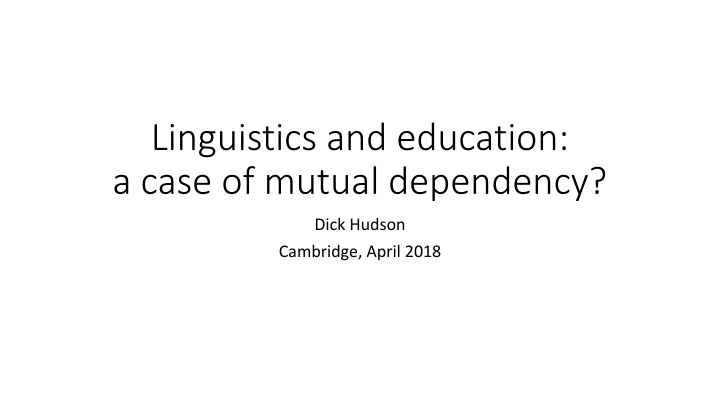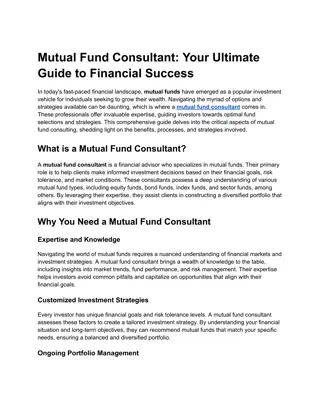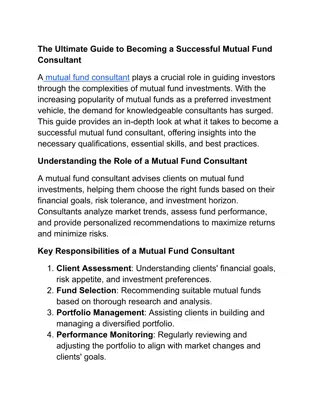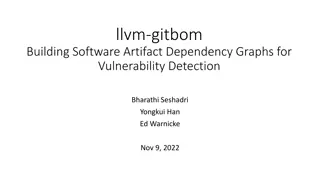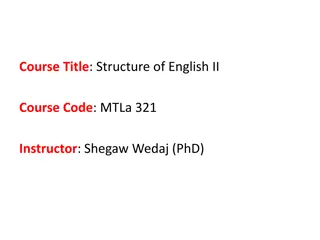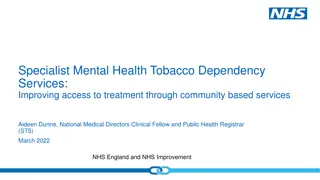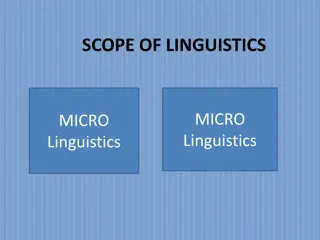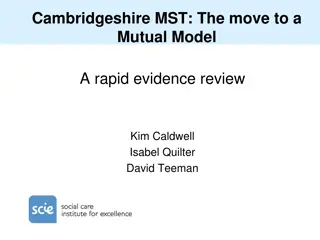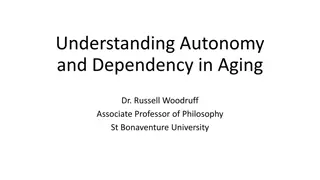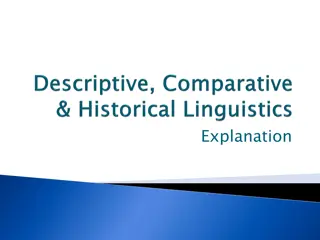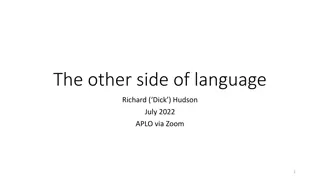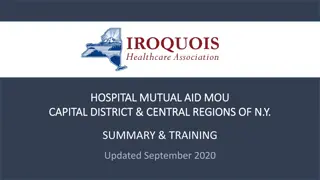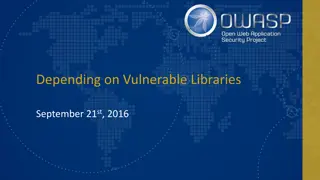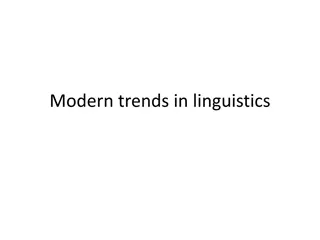Linguistics and education:a case of mutual dependency
This content delves into the intricate relationship between linguistics and education, tracing back to medieval times and exploring the evolution of grammar teaching, with a focus on theory and practice. From the role of grammar in medieval Cambridge to the debates in Christian theology and Arabic grammar, it uncovers how educational practices have intertwined with linguistic theories over centuries.
Download Presentation

Please find below an Image/Link to download the presentation.
The content on the website is provided AS IS for your information and personal use only. It may not be sold, licensed, or shared on other websites without obtaining consent from the author.If you encounter any issues during the download, it is possible that the publisher has removed the file from their server.
You are allowed to download the files provided on this website for personal or commercial use, subject to the condition that they are used lawfully. All files are the property of their respective owners.
The content on the website is provided AS IS for your information and personal use only. It may not be sold, licensed, or shared on other websites without obtaining consent from the author.
E N D
Presentation Transcript
Linguistics and education: a case of mutual dependency? Dick Hudson Cambridge, April 2018
My focus Grammatical theory I m a grammarian I defend dependency structure (among other things) School teaching of and about language L1: literacy and English L2: Foreign So: How can grammatical theory engage with school teaching? First: some historical perspective on the main issues
Grammar teaching matters: Medieval Cambridge Issue: How to teach grammar Issue: How to train teachers ... The normal undergraduate came to Cambridge when he was 14 or 15, or even younger, and the general course of study in arts lasted for seven years.... The entrants were expected to know no more than reading, writing, and a little Latin ... the knowledge of the last subject, or 'grammatica', would be gained at the university itself ... the degree of master of grammar survived into the 16th century ... The grammar course was a training ground for future schoolmasters ... the master received a palmer and rod from the Vice-Chancellor and publicly beat a boy in the schools.
Issue: Why teach grammar? 1542: Lily s English Grammar of Latin
The viii partes of speche Issue: Universal or parochial?
And earlier: Christian theology 11th century: grammar teaching is wrong because it teaches that the word for God has a plural. (Peter Damian, 1007-1072) 6thcentury: classical Latin grammar was wrong because it wasn t the Christian language of divine revelation. (Pope Gregory the Great, 590- 610) Issue: Bad arguments against teaching grammar
Arabic grammarians of the Abbasid Caliphate (8th 10th century)
Sibawayh (760-796) Issue: Theory vs fact in both research and teaching A Muslim Persian Wrote The Book The first grammar of Arabic Especially for L2 learners Aimed at theoretical explanation rather than mere description Gave more attention to syntax than to morphology The Question of the Hornet : Sibawayh (Basra) v Al-Kisa i (Kufa) Predicate pronoun = nominative or accusative? Sibawayh argued from theory (for nominative ) Al-Kisa i argued from native speakers (Bedouin) who he had bribed to support the accusative Sibawayh retired humiliated, went home and died (age 36).
The Grammar Game: Basra v Kufa The agreed rules of the game: Syntactic relations are dependencies between words. They re defined in terms of morphosyntax (case, mood). The burning question: is mutual dependency possible? e.g. Zaydun tawilun (nominative + nominative) Zayd is tall Kufa: yes the subject and predicate govern each other in the nominative. Basra: no governors precede governed, so how can they both precede? Issue: How to reconcile subject/predicate with dependency.
A thousand years later, much further west ... 1877 Reed and Kellogg (USA) 2018 app! Mixture of structures 1873 Brassai (Hungary) 1884 Kern (Germany) 1956 Chomsky Issue: How to avoid reinventing the wheel. Issue: What about mutual dependency? Issue: the role of diagrams in research and teaching.
So what? Grammar teaching has been important. Mainly for teaching L2 (Latin, Arabic, ...) Grammar teaching benefited from brilliant research. But it can easily turn into dogma. Grammar research benefited from brilliant teaching. e.g. diagramming systems. But it too can easily turn into dogma, driven by fashion rather than evidence. So teaching and research are mutually dependent.
The ideal education cycle adult know- ledge school teaching university research know- ledge school infant 12
The real UK in 2018 Knowledge About Language (KAL) has very low profile in schools. No systematic and cumulative grammar No systematic vocabulary No differences between dialects or between languages In spite of National Curriculum But A-level English Language is popular (since 1983) Grapheme-phoneme correspondences (phonics) (since 1997) Primary grammar is required for SPaG tests in Year 6 (since 2013) But will secondary schools builds on this knowledge?
KAL: the grammar audit The audit tested KAL of incoming undergraduates of linguistics or foreign languages: 1986 (Aston and UCL) 2009 (Aston, UCL and 11 other UK universities) 2010 (Zaragoza University, Spain)
1986: An FL student (French & Spanish at A-level) Results (average errors per person) Aston/UCL: Zaragoza 1986: 3 2009: 6 2010: 2 15
The dire consequences: Foreign Langs French + German + Spanish FGS 50000 45000 40000 All A-levels: 35000 1975: 500K 2015: 850K 30000 25000 20000 1988 O-level + CSE > GCSE 15000 Communicative teaching started Decline affects state schools, not independents. 10000 5000 0 1965 1975 1985 1995 2005 2015 FGS
Language education from 2003 English Language A-level 60,000 2012: Eng Lang = French + German + Spanish 50,000 40,000 Eng Lang Eng Lang & Lit 30,000 Eng Lit But literature > lang (+ lit) FL (F,G,S) 20,000 10,000 Eng Lang is mainly in state schools 0 2003 2004 2005 2006 2007 2008 2009 2010 2011 2012 2013 2014 2015
Too many adults are illiterate 1998 (Moser Report): Some 7 million adults in England - one in five adults - if given the alphabetical index to the Yellow Pages, cannot locate the page reference for plumbers. 2013 OECD: 9 million adults ... more than a quarter of adults aged 16-65) [have]low literacy or numeracy skills or both. ... These 9 million people struggle with basic quantitative reasoning or have difficulty with simple written information. They might, for example, struggle to estimate how much petrol is left in the petrol tank from a sight of the gauge, or not be able to fully understand instructions on a bottle of aspirin.
Illiterate adults 2016 OECD: % 16-19 year-olds with low literacy or numeracy
Science and literacy From a 2017 Royal Society report: Literacy: in correlational studies of science learning, the strongest and most consistent predictor of pupils scientific attainment has undoubtedly been how literate they are. Some of the possible reasons that have been given for this connection are the importance of reading scientific texts and preparing written scientific reports; the effects of reading on pupils scientific vocabulary; the usefulness of understanding the morphemic structure of words in learning scientific terms. There is a strong relationship between pupils SES and their literacy.
Teacher supply But the E-bacc requires a language at GCSE (75% by 2022) so many more FL teachers will be needed. DfE is offering money to recruit BA students.
Teacher preparation: Whats in a BA? Russell-group language departments: 2016: Depts of French offering modules on the linguistics of French: 14/22 modules on applied linguistics: 2/22 2011: Research-active teachers: language focus as % of total English: 20% French: 12% So: a typical language (Eng of FL) department doesn t teach about the language doesn t promote teaching as a career
So whats the problem? Poor teacher preparation in BA English or FL. No KAL. No cooperation across languages. So: too few teachers full of good KAL and cross-language interests. So: lack of language analysis in schools. Arguably contributing to poor success rate in both. So: too few FL entries at A-level. So: decreasing applications for FL degrees. decreasing FL applications from state schools for linguistics degrees.
The broken education cycle adult know- ledge school teaching university research know- ledge school infant 24
Interdependence and action Education depends on linguistics for good KAL. ideas: e.g. descriptivism. models: e.g. form, class and function. analyses: e.g. the English auxiliary verbs. Linguistics depends on education for good students interested in language. informed about language structure and analysis. informed about both L1 and at least one L2.
So whats to be done? Fix the teacher supply: promote teaching as a career provide more relevant BA courses Support current teachers: teaching materials courses in linguistics for teaching Lobby for a better curriculum more credit for KAL
Who? Language departments?? Linguistics/English language departments LAGB/BAAL/PhilSoc
How? Continue to promote linguistics in schools UKLO Trinity essay prize ? Offer modules on structure of FL language teaching. Produce (maybe collaborating with a teacher) reference books on grammar, vocabulary, phonics, ... teaching books research digests Persuade exam boards to give credit for KAL.
The mended education cycle adult know- ledge know- ledge school teaching university research know- ledge school infant 29
